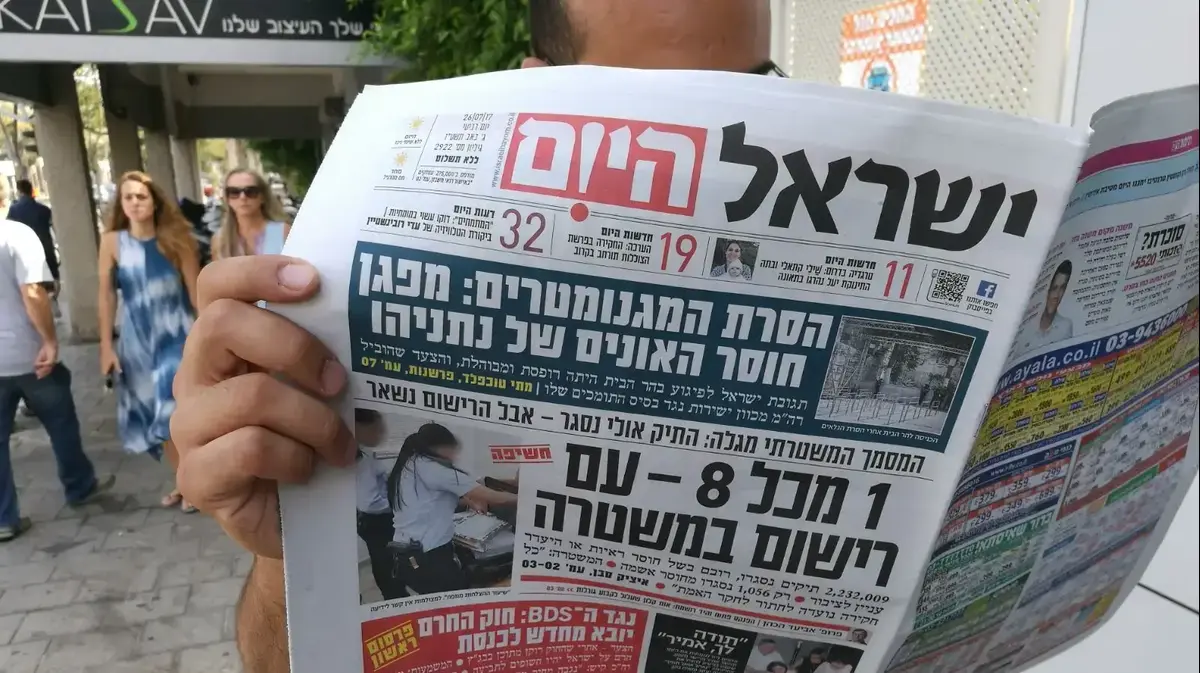In March 1953, Israel and Germany ratified their reparations agreement, under which Germany undertook to transfer billions of dollars in goods, raw materials, industrial equipment, and more to Israel over the course of 12 years. This sum was intended to compensate for the burden that fell on the young State of Israel, which was required to settle masses of Jewish refugees from Europe who were left destitute in the wake of the Holocaust.
Despite the signing of the agreement, Israel refused to establish diplomatic relations with Germany, and therefore lacked a representative infrastructure and professional and skilled personnel in Germany to handle the complex commercial aspects required as a result of the reparations agreement.
No less than 3,000 Israelis applied to be included in the Israeli shopping delegation, which was based in Cologne, Germany. None of the applicants was hired by the delegation, since the forces pulling the strings in the various government ministries took care of themselves and their well-being.
The Germans, for their part, were already ready to begin trading and transporting goods and raw materials to Israel, but the establishment of the delegation team took longer than expected, and some of them asked to return to Israel a few days after landing in Cologne. The reason: poor working conditions, very low quality places to live, and an Israeli salary that was not in line with the very high cost of living in Germany at the time.
The disappointment and bitterness that gripped the members of the delegation in Germany adversely affected their work. For example, six months before their departure to Germany, the delegation compiled preliminary assessments of the immediate needs of industry in Israel, but when the delegation landed in Cologne, these estimates were delivered as invitations to the Germans, without a more recent examination of the Israeli manufacturers. The Germans responded quickly, organized the necessary shipments and loaded them onto cargo ships bound from Germany for the port of Haifa. Only at this late stage did the heads of the delegation remember that it was appropriate to keep up to date in Israel before the list of invitations was handed over to the Germans.
Indeed, when the ships were unloaded in Haifa, it turned out that the industrialists required less than a tenth of the total raw materials and equipment that arrived – and there was a lot of commotion.
The IRS establishes a system of "Steinkers"
Income Tax poster, 50s // Design: Shamir Brothers Studio,
On June 9, 1953, Income Tax Commissioner Benzion Argov held a press conference in which he announced a series of actions that his office intended to implement "with the aim of expanding the circle of taxpayers in Israel."
At the press conference, it emerged that the Ombudsman had just completed a comprehensive investigation operation in Tel Aviv, and had located no less than 15,<> residents of the city who had never paid income tax. "We know the addresses of all these tax evaders, and they will receive declaration forms regarding their income by mail in the coming days."
It was reported that those who do not return the signed forms to the Income Tax within two weeks of receiving them will receive a home visit from the tax assessors, "in which case they will be forced to pay their taxes retroactively from the date of the establishment of the state," Commissioner Argov threatened.
Subsequently, the commissioner stunned the journalists when he reported that the Income Tax is in the midst of a process at the end of which there will be 14 public committees composed of experts in the textile, metal, printing, construction, and other industries that will advise tax assessors on whether this or that assessment report is relevant to the reality in the economy.
A reporter for the communist newspaper Kol HaAm shouted at the commissioner: "You want to establish Steinker committees," but the commissioner, ignoring the interim call, announced that "alongside the establishment of expert committees, taxpayers will now be required to be their own experts and attach to the report a check in the amount of tax that matches their income according to their declaration. Real taxpayers won't hear from us until at least next tax year."
All the actions taken by the Income Tax stemmed from the fact that the Israeli economy had not yet overcome the economic crisis that began in February 1952. The state coffers threatened to run out towards the middle of 1953, the Ministry of Finance was forced to reduce the flow of funds to the various ministries, the salaries of civil servants were paid significantly late – and all this created a real fear of the collapse of the government systems.
Will the traffic policemen also be judges?
Traffic policeman in southern Israel, 1953, photo: Moshe Friedan, GPO
In June 1953, new transportation regulations came into force, called the "Traffic Arrangement Clauses". These regulations gave the police much broader powers than they had previously, and allowed traffic officers to use more biting punishment for any potential offense committed by drivers on the roads.
The new regulations were part of an attempt by Transportation Minister Yosef Sapir and Police Minister Bechor-Shalom Sheetrit to eradicate the phenomenon of excessive speed when traveling vehicles, which, according to experts, is the number one cause of road accidents.
In order to check the speed of travel in those days, the traffic police established squads of three policemen, equipped with wireless communication between them. Two of the officers stood 100 meters apart and calculated by applying a stopwatch meter the speed of a passing vehicle. The third officer, who positioned himself further down the road, received a description of the vehicle to be stopped for speeding.
A driver who was arrested by a traffic policeman for any violation of traffic regulations received an immediate summons for trial, but was given the option to cancel his trial if he paid within seven days in the court treasury the amount of the fine set for him by the policeman, according to the severity of the offense he committed.
Minister Yosef Burg promotes postal services in Israel
When the state was established, its leaders did not believe that the postal sector deserved a government ministry of its own, and until November 1952 the post office functioned as a division of the Ministry of Transport. This greatly complicated the services, which in the early years of the state focused mainly on delivering letters and parcels.
The revenue collected by the post office for stamps was transferred to the Ministry of Finance, while the expenses were paid from the budget of the Ministry of Transport, which considered the post office to be a stepchild, limited manpower and created failed and inefficient logistics, which resulted in painfully slow letter transfers and long lines at post offices.
When Hapoel HaMizrahi joined the coalition at the end of 1952, 43-year-old MK Yosef Burg was appointed its minister, effectively the first postal minister in Israel. Borg injected new blood and energy into the postal service system, and remained in office for five and a half years, until July 1958.
Burg planned the postal services in Israel for years to come, and although there were only slight improvements in the field of letter delivery and post branch activity during his tenure, over the years he succeeded in realizing some of his plans and raised the postal services by several levels. Among other things, he established the Postal Bank and was one of the initiators of the "Moving Mail" services, which connected hundreds of remote communities in the Negev and Galilee to the center of the country by means of postal vans that would arrive regularly to every locality – even the most remote one. Radio telephone equipment was installed in most of the mobile vehicles, through which telegrams could be sent for the first time from almost anywhere and to any settlement point in the country.
Minister of Posts Yosef Burg, 1953, photo: GPO
Borg also greatly promoted teleprinter services, which helped expand business activity between the various parts of the country and between Israel and the world, and worked to expand telephone infrastructure. He even initiated the publication of a monthly magazine called "Mail - Post, Telegraph and Telephone Affairs", which was distributed throughout his years of activity among the employees of the Post Office, "in order to create among the members a unit pride", as he put it.
The Vanished/Businesses That Were
Producers of Tourist Postcards
Photo: Nostalgia Online Archive,
For almost 200 years, souvenir postcards were sold here to tourists, usually including exotic paintings from the Land of Israel (such as the one pictured by David Roberts in 1834), or a variety of Jewish and Zionist motifs. Beginning in the 60s, postcards carrying colorful photographs of the state began to circulate, and they were placed on a rotating "carousel" device in tourist shops. The tourist postcard manufacturers industry has become redundant over the years, as the digital revolution in Israel has turned every mobile phone owner into a "manufacturer" of fine color photographs of his own.
The consumer / items we once
bought a token for a viewing balcony before a flight
Photo: Nostalgia Online Archive,
In those times, when traveling abroad was rare, the passengers were accompanied by an entire entourage of family, relatives and friends, who came together to Lod airport to breathe some "foreign air". After saying goodbye to the passenger, who preferred to go to the duty-free shop hours before the flight, the escorts would hurry and purchase small tokens (pictured), which allowed them to enter an observation deck from which they could wave enthusiastically to the passengers, until they got tired.
Protest strike in men's hairdressers
Photo: Shturman Collection, "Biphoto" Archive,
The management of the Association of Men's Hairdressers in Israel determined in mid-June 1953 that "according to the new Hours of Work and Rest Law, hairdressers will work in the mornings from 08:00 to 12:00, and in the afternoon from 14:00 to 18:00, for a total of eight hours." The announcement caused a storm, and Ephraim Binder, head of the hairdressers' committee in Tel Aviv, sent a telegram to the union's management warning that "towards evening, traffic in the hairdressers increases, when workers return from work and business owners close their businesses." The union management insisted that "a law is a law", and in response, the owners of the hair salons declared a general strike. At the end of three days, it was agreed that "the owner of the barbershop will work as he pleases, while the hired barber will arrive at 09:00 and leave at 19:00, so that the spirit of the law will be preserved." Photo: Hairdresser in Tel Aviv, early 50s
Ads that were
Do you have photos or memorabilia from the early days of the country? Write to us: Yor@ShimurIsrael.Org
Wrong? We'll fix it! If you find a mistake in the article, please share with us








/cloudfront-eu-central-1.images.arcpublishing.com/prisa/2MPOQCRTTCJVHEV6VONEC6SDGY.jpg)
